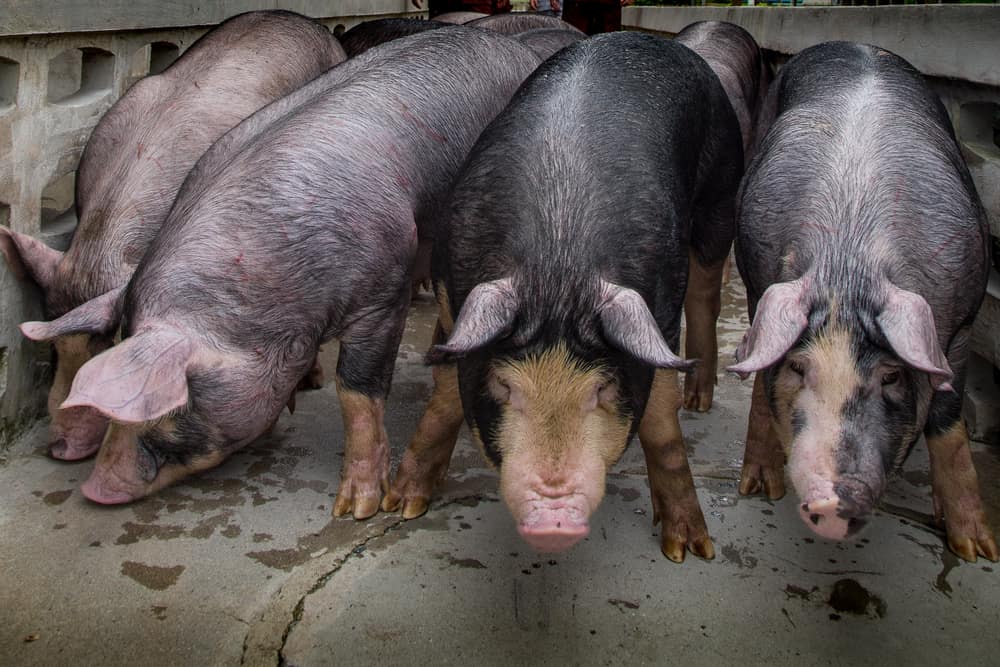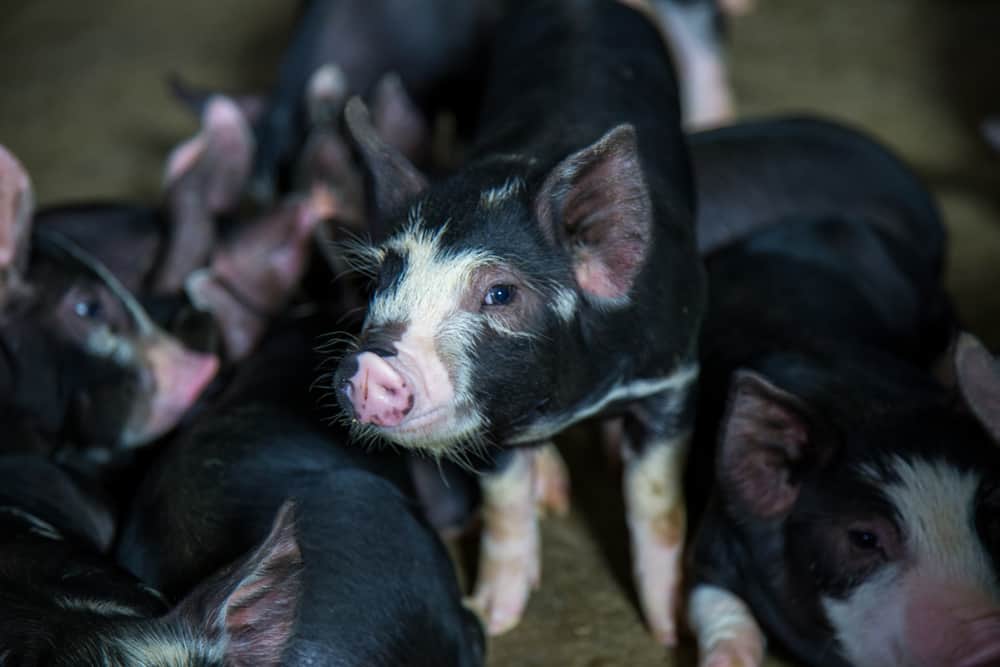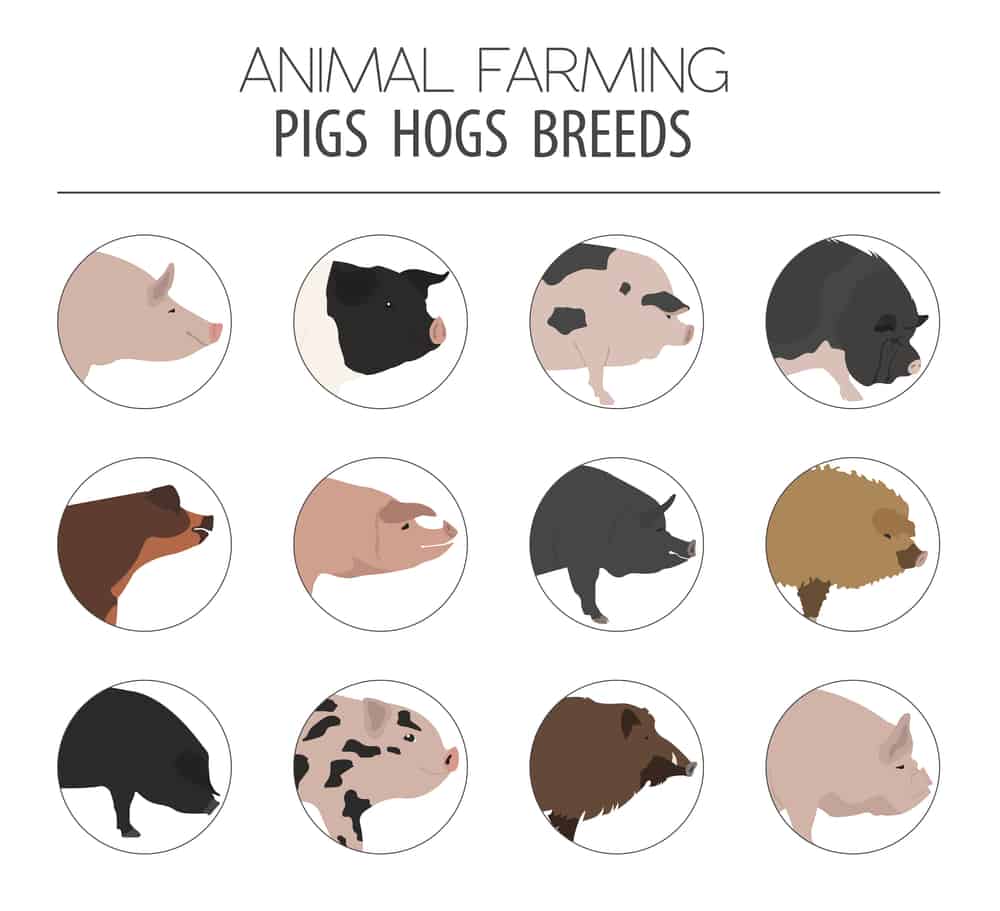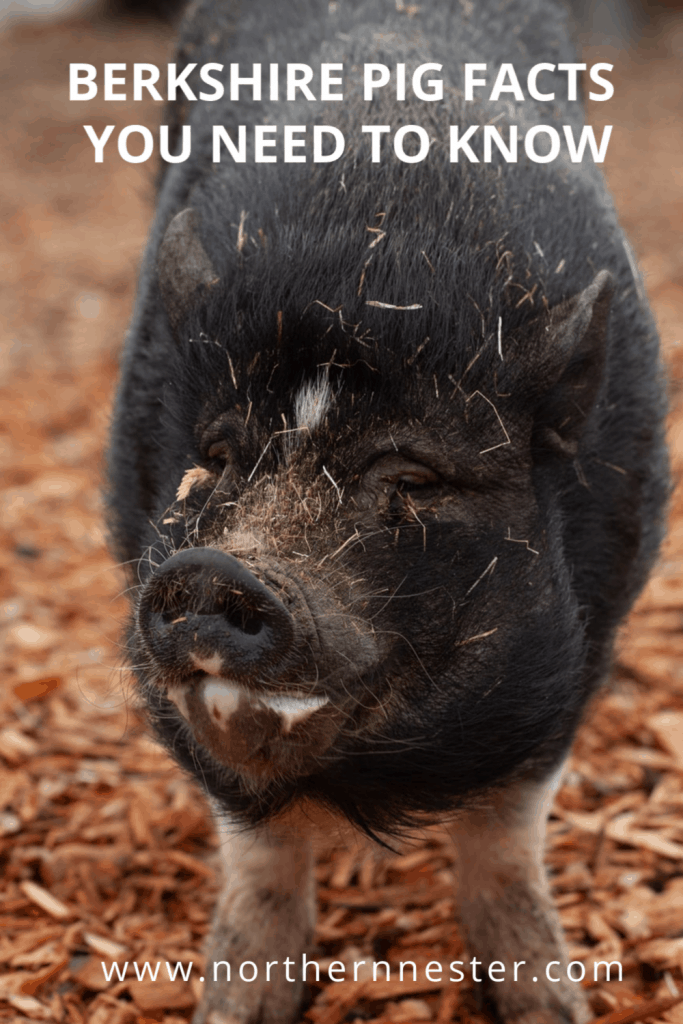
Berkshire pigs are a welcome addition to any farm, small or large.
With their black pot bellies and sweet demeanor, they are easy to tend to and produce delicious meat.
Why should you choose Berkshire pigs?
When you think about farms, pigs naturally come to mind.
Farmers raising pigs has been a pastime forever and one of the best breeds to have on a farm is the Berkshire pig.
This intelligent, robust pig is easy to have around and produces delicious, well-marbled meat.
You can’t beat Berkshire pork which is why these pigs will always have a place on a thriving farm.
Berkshire pig origin and history
Berkshire pigs are named so because of where they originated. 300 years ago, in Berkshire, England, the breed was perfected, resulting in its now characteristically black fur and flavorful meat.
Since their English origins, Berkshire pigs can now be found the world over, including Japan, the United States, Australia, and New Zealand.
Berkshire pigs are classified as lard pigs, in that they have a high concentration of fat.
While this was once an enviable tradition, after World War II, there was less need for lard and so they fell out of favor.
Now the culinary world has embraced fatty, tender meat again, so Berkshire pigs have seen a renaissance.
There is now increasing interest in this breed of pig, both on smaller homesteading farms, and in wider culinary settings.
Interestingly, Berkshire pigs were considered a rare breed in England, but thanks to the recent resurgence, the breed is now thriving.
Berkshire Pig Characteristics

Berkshire pigs have very distinct characteristics. This is what you can expect from their breed.
Size
The average Berkshire pig will be between 27 and 29 inches tall.
This isn’t very large which is why they are especially suited for hobby farms and pig farming.
Weight
In regard to weight categories, Berkshire pigs fit in the average to large breed category.
The average weight of a mature male pig will be 600 pounds while a female pig will average 400 pounds.
This can seem like a tremendous size, especially given the fact that piglets will weigh only a few pounds at birth.
What’s more, it takes less than a year for a pig to tip 200 pounds on a scale.
Color
Berkshires are almost always black pigs. However, their feet are actually white, giving them the appearance of wearing socks.
There is also usually a white mark on the snout of each pig.
Because of their dark color, Berkshire pigs have the added benefit of not getting sunburnt. This is just one less worry you need to have as a farmer.
Lifespan
You can expect Berkshire pigs to live between 6 and 10 years of age.
While pigs are prone to predators in the wild, on farms, as long as they are cared for properly, your pigs should be able to reach this average lifespan, if you so wish.
Intelligence
One of the defining characteristics of Berkshire pigs is their intelligence.
They take good care of their piglets and can become part of the farm family.
Their intelligence might make it hard to raise for meat purposes, but it will also make you appreciate and care for them more, allowing them to have a happy life.
**Looking for another great farm pig option? Check out our complete guide about Duroc pigs here!**
How much does a Berkshire pig cost?
You can expect to pay between $100 to $150 for a Berkshire piglet. If you want a mature Berkshire hog, expect to pay at least double this amount.
It can be hard to find someone selling Berkshire pigs. It’s best to look at local farming societies or online resources.
The American Berkshire Association has a comprehensive website and would be a good place to start when looking to buy any pigs.
Breeding

Breeding Berkshire pigs is a fun and profitable experience.
The intelligence of the animals means there aren’t many behavioral issues and the resurgence in their meat means there will always be buyers.
Pigs that are raised naturally come at a premium and if you can create a breeding program, you can tap into this new revenue stream.
Berkshire pigs are an excellent way to do so, and even the Royal Family once raised Berkshires at Windsor Castle.
The gestation for a sow is 116 days, which is a few days longer than other similar breeds of pigs. You can expect litters of 8 to 10 piglets, although larger ones do happen.
Once they have given birth, Berkshire sows become excellent mothers.
There are hardly ever issues with milk production and their calm, caring disposition is reflected in the health of the piglets.
Meat Quality
In the world of pork, there are two kinds: lard pigs and bacon pigs.
Berkshire pigs fall into the category of lard pigs because of their high-fat content which is richly marbled.
Below is a short video explanation of Berkshire pigs meat quality:
The result of cooking marbled meat is a juicy, tender taste as the fat is rendered while cooking.
Berkshire pork is seen as a culinary delight, especially by Japanese chefs, which along with their Kobe beef, know the potential of well-marbled meat.
Related Questions
What is the Berkshire pig known for?
Berkshire pigs really tick all the boxes. They are incredibly intelligent and are right at home in any farming situation.
Berkshire pigs are bread because they produce delicious meat that is juicy, tender, and full of flavor.
Are Berkshire pigs good for meat?
Yes, Berkshire pigs are great for meat-eating. Their meat is incredibly delicious, thanks to its flavor palette and juiciness.
Berkshire pigs are one of the top pig variety because they consistently produce excellent meat.
What is the Berkshire pig used for?
The meat of Berkshire pigs is quite fatty, but it is fatty throughout, leaving delicious, heavily marbled meat.
You can use the pig meat for all cuts of pork and therefore all kinds of meals and dishes.
Are Berkshire pigs good mothers?
The intelligence of Berkshire pigs is particularly noted when they rear their young.
These pig mothers, or sows, take good care of their piglets. They are healthy to start with and don’t stress easily.
The result is that litters of piglets almost always farewell and reach maturity.
Related Content: Hampshire pigs, if you want much leaner meat!
Conclusion
If you have a hobby farm and are looking into meat production as a new revenue stream, Berkshire pigs are an excellent choice.


